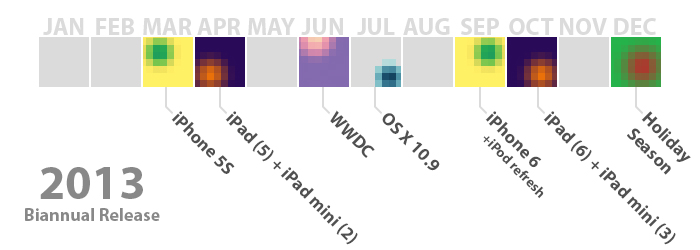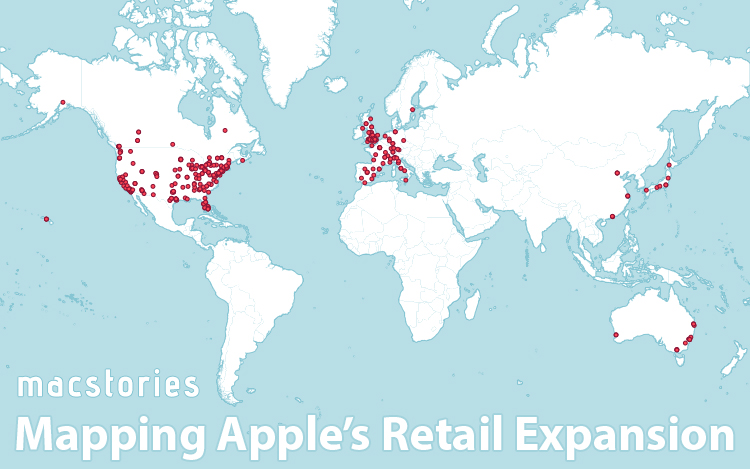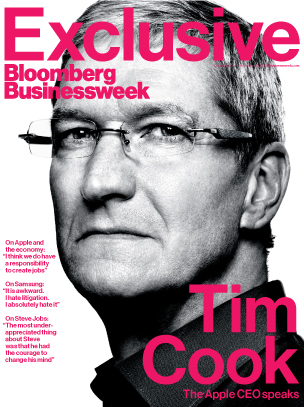Just over a month ago, Horace Dediu of Asymco penned an article entitled ‘Does S stand for Spring’ in which he hypothesised that perhaps Apple might be moving to a biannual (twice-yearly) release cycle for the iPhone and iPad. Over the past month I’ve gone back to read Dediu’s hypothesis as news articles and analyst opinions surfaced and I did some analysis of Apple myself. It’s got to the point that I really think Dediu’s hypothesis has got real potential to become reality. So I decided to take some time to present Dediu’s evidence in a slightly different way, elaborating on some of his evidence and hopefully add to the discussion. But if you haven’t read the Asymco article yet, I’d highly recommend you do so before proceeding:
Posts tagged with "apple"
Could Apple Be Moving To Twice-Yearly iPhone & iPad Releases?
Mapping Apple’s International iPhone & iPad Rollouts
Apple has on three seperate occasions announced that the iPhone 5 will have the fastest international rollout of any iPhone ever - at the announcement keynote, during the Q4 earnings call, and in their press release announcing opening weekend sales of the iPhone 5 in China. The claim was, no doubt, meant to impress investors, press and the general public, but I was curious as to how fast it really was compared to previous iPhone rollouts. So I decided to track down the launch schedules of all the iPhones to date and then again with the iPad. In the end I found a few trends, some oddities and that Apple’s claim was (mostly) true.
iPhone 5 will be available in more than 100 countries by the end of December, making it the fastest iPhone rollout ever.
Apple Announces Q1 2013 Conference Call for January 23
Apple’s first quarter earnings report and conference call will take place on January 23rd, 2013, according to an Investor Relations update on Apple’s website first noted by MacRumors. Apple will provide a live audio webcast of the event.
Apple plans to conduct a conference call to discuss financial results of its first fiscal quarter on Wednesday, January 23, 2013 at 2:00 p.m. PT / 5:00 p.m. ET.
For the fourth fiscal quarter of 2012 (which ended on September 29th), Apple posted revenue of $36 billion ($8.67 per diluted share), with 14 million iPads, 26.9 million iPhones and million 4.9 Macs sold. In Q4 2012, the company reported quarterly net profit of $8.2 billion, and the entire 2012 fiscal year generated $156.53 billion revenue for Apple.
The first fiscal quarter is traditionally the biggest quarter of the year for the company, as it directly follows the holiday season, including sales for Thanksgiving/Black Friday in the US and Christmas. Q1 2013 will provide a first real insight into sales of the iPad mini, and it will offer details on the iPhone 5’s performances following several international launches in the past few months (international sales accounted for 60 percent of Apple’s revenue in Q4 2012) and the fact that, when Q4 2012 ended on September 29th, the device had only been out for 8 days in 9 countries (where it was released on September 21st).
On December 3rd, the iPhone 5 was available in 47 countries; after Apple’s announcement, the availability of the device jumped to 102 countries by the end of December 2012, with an average of 1.04 countries added in 98 days since the first rollout on September 14th (when pre-orders were launched). In mid-December, Apple announced that first weekend sales of the iPhone 5 in China topped 2 million units.
As for the iPad, the WiFi version of the mini went on sale on November 2 in 34 countries alongside the fourth generation model. Various international rollouts followed the initial launch; Apple also started releasing the WiFi + Cellular version of the iPad mini in mid-November. On November 5th, Apple announced it had sold 3 million iPads (mini + 4th gen) in three days. For context, the 3rd generation iPad launched in 10 initial countries, and then rolled out to 25 more a week later; both WiFi and WiFi + Cellular versions of the 3rd generation iPad were available at launch.
In its guidance for the upcoming first fiscal quarter, Apple said they are expecting “revenue of about $52 billion and diluted earnings per share of about $11.75”; it’s worth keeping in mind how Apple usually “lowballs” its guidance, subsequently “beating” analysts’ (and their own) expectations.
We will provide live updates from the conference call on our site’s homepage on January 23rd starting at 2 PM PT.
Apple: iPhone 5 First Weekend Sales in China Top Two Million
Apple has just announced that they’ve sold over two million iPhone 5s in China since it launched three days ago on Friday, December 14th. That compares to the more than five million that were sold in the first weekend of the iPhone 5’s availability back in October (where it was available in nine countries).
“Customer response to iPhone 5 in China has been incredible, setting a new record with the best first weekend sales ever in China,” said Tim Cook, Apple’s CEO. “China is a very important market for us and customers there cannot wait to get their hands on Apple products.”
Apple has also re-iterated that the iPhone 5 will be available in more than 100 countries by the end of December, which Apple says will be “the fastest iPhone rollout ever”.
“This Won’t Happen On iOS”→
“This Won’t Happen On iOS”
I found myself nodding in agreement with Jason Snell’s latest piece for Macworld:
That’s why I’m optimistic that the dismissal of Forstall to tend his garden might be just the shake-up that iOS needs. In the operating system’s nearly six years of existence, Apple hasn’t really rethought any of iOS’s major features. We’ve seen the continual addition of new features, but very little has disappeared to be replaced by something utterly new. iOS is pretty good, but that stasis is odd, and perhaps even a little self-delusional on Apple’s part: Nothing is inviolably perfect, especially on the first try.
For me, there are two sides to this argument. I have been advocating iOS, and especially the iPad, as a platform capable of doing tasks previously exclusive to “real computers”. At the same time, I’ve also been trying to focus on how “regular people” could benefit from using apps that we thought were only “for geeks”. Maybe not Pythonista or another scripting app, but definitely – just to name two examples – apps like 1Password or Launch Center Pro.
And yet, the single reply I get the most every day is that “this won’t happen on iOS”. Some people seem to think that just because Apple was successful in reinventing the mobile OS five years ago, then they’ll have to stick to that model forever. That they’ll have to keep the Mail app as it is, that they’ll avoid considering more “power user features”, and that trying to make technology work for everyone – from grandparents to nerds – is wrong.
I disagree with the notion that the philosophy of iOS is set in stone. If there’s anything great about software, is that it can be changed. Sometimes it’s a huge undertaking, but it can happen.
I’m not saying change is always good – because I don’t know. But like Jason says, being static and complacent isn’t good either: the market is changing, people change their habits and needs. Eventually, change is not only good, but necessary.
And if Apple didn’t believe this too, we’d all be using a stylus today.
The Brand New Apple Services, Stores, and iCloud System Status Page→
The Brand New Apple Services, Stores, and iCloud System Status Page
On Thursday afternoon, Apple updated their System Status page for Apple Services, Stores, and iCloud. In an effort to be more transparent with customers, each of Apple’s main services has been broken down into categories that gives an overview of the products that are currently online or experiencing issues. Below the status board, a detailed timeline explains any issues experienced and when they have been resolved. In short, iOS users troubleshooting problems with Mail for example will no longer be left wondering if issues are on their end or Apple’s.
Via The Next Web
Apple Posts “Best Of App Store 2012” Lists
In today’s weekly refresh of the App Store, Apple posted a list called “Best of 2012”, highlighting the apps they “loved the most” this year. Day One, a journaling apps we reviewed on MacStories several times, wins as “Mac App of the Year”; “Deus Ex: Human Revolution” wins as “Game of the Year”. The Mac section is also viewable on the web here. On the iOS side, Paper for iPad and Action Movie FX win as Apps of the Year; Rayman Jungle Run and The Room win as Games of the Year for iPhone and iPad, respectively.
Over the past year, the Mac App Store was packed with impressive new apps and games. Some were dazzling debuts, while others were existing apps updated to leverage new features in OS X Mountain Lion or to take advantage of the Retina display of the new MacBook Pro. Browse the apps and games we loved most in 2012.
The list is organized in Runners-Up, Best Apps of 2012, and Best Games of 2012. Below, the full list, recompiled from the Mac App Store, iPhone App Store, and iPad App Store. My personal congratulations to the Day One team, an app that has completely changed the way I archive my memories on iOS and OS X.
Other notable winners in iTunes categories include:
- David Sparks’ Paperless for Books Made with iBooks Author
- The Talk Show with John Gruber in Best New Technology podcasts
- Amplified in Best New Technology podcasts
Mapping Apple’s Retail Expansion
Apple opened its first retail stores on May 19, 2001 - one in Virginia and the other in California. In the Steve Jobs biography, author Walter Isaacson wrote how Jobs had wanted Apple to have its own stores so that their iMacs didn’t have to “sit on a shelf between a Dell and a Compaq while an uninformed clerk recited the specs of each”. Despite initial criticisms and comparisons to Gateway’s failed retail stores, Apple Stores not only continue to exist today, but are regarded as one of Apple’s greatest innovations - one that now contributes to more than 10% of Apple’s revenue.
“Unless we could find ways to get our message to customers at the store, we were screwed.” - Steve Jobs
I’ve previously written about the coverage of Apple’s entertainment services in international markets (including how they compare to Google, Microsoft and Amazon), so I was similarly intrigued by how Apple’s stores have expanded into countries outside the US. Whilst researching all this, I came across other questions such as whether Apple had a particular preference for when they opened new stores and how the expansion of their retail network would affect visitors and profits. What I have found isn’t particularly groundbreaking, but there are certainly some trends and fascinating tidbits that I’ve come across, all of which is detailed below the break.
A note to RSS readers: This article includes an HTML5 diagram that likely won’t display in your reader, view this post in your browser (it works on iOS devices) to view that diagram. Apologies for the inconvenience.
Tim Cook Speaks With Businessweek In A Wide-Ranging Interview→
Tim Cook Speaks With Businessweek In A Wide-Ranging Interview
Josh Tyrangiel of Bloomberg’s Businessweek has a terrific and in-depth interview with Apple CEO Tim Cook. In it, Cook is asked a whole swathe of questions from transparency, to the recent executive changes, Apple’s competition, US manufacturing and a lot more. The whole article is available online and in the latest edition of Businessweek. NBC will also air an interview with Tim Cook today on it’s Rock Center program at 10pm/9c in the US.
Talking of Apple Maps, Cook is asked whether Apple took on an approach of doing something for strategic company purposes, rather than something that would make the product better. Cook rebuffs this suggestion and suggests that they wanted to enable certain features such as directions and voice integration and set upon accomplishing them.
We set on a course some years ago and began to do that. So it wasn’t a matter of saying, “Strategically it’s important that we not work with company X.” We set out to give the customer something to provide a better experience. And the truth is it didn’t live up to our expectations. We screwed up.
Asked about manufacturing and whether Apple might bring back some manufacturing efforts back to the US, Cook responds that they will begin to do so in 2013 for certain Mac products. It lines up with recent reports of the new iMacs arriving with “Assembled in USA” engravings. You can also see an excerpt of the Rock Center interview here in which he discusses this transition back to the US.
And next year we are going to bring some production to the U.S. on the Mac. We’ve been working on this for a long time, and we were getting closer to it. It will happen in 2013. We’re really proud of it. We could have quickly maybe done just assembly, but it’s broader because we wanted to do something more substantial. So we’ll literally invest over $100 million. This doesn’t mean that Apple will do it ourselves, but we’ll be working with people, and we’ll be investing our money
These are just a few snippets of the interview, be sure to read the entire interview over at Bloomberg Businessweek, it’s a must read.









